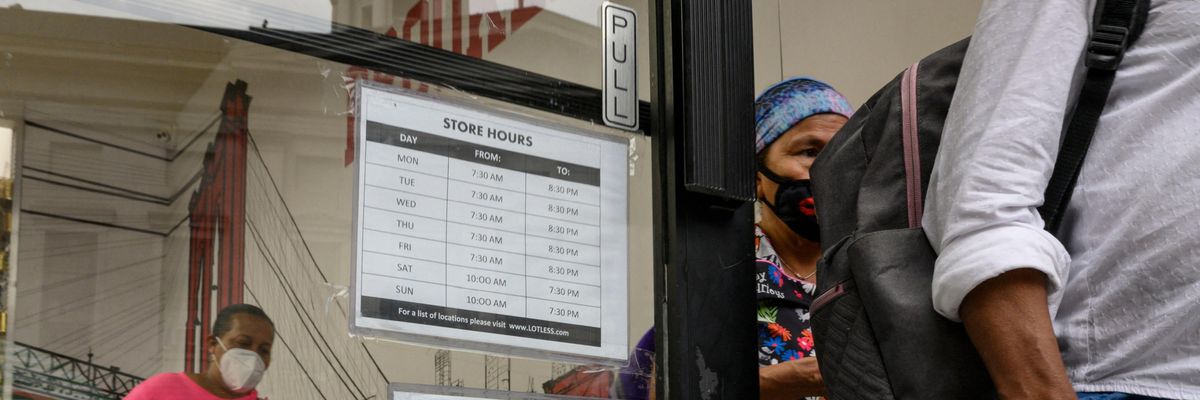New federal data published Friday shows that U.S. job growth slowed last month, a sign that the Fed's aggressive interest rate hikes are starting to take their toll on the labor market.
According to the Bureau of Labor Statistics (BLS), employers added 263,000 jobs in September--less than the 315,000 added the month before and slightly below analyst expectations. The unemployment rate, meanwhile, fell to a historically low level of 3.5% as labor force participation declined slightly.
Nominal wages rose just 0.3% last month, further undercutting the notion that a wage-price spiral is to blame for stubbornly high inflation.
"If the Fed continues down this path, workers could suffer from a recession with persistent high prices, high unemployment, and lower wages."
"These data don't point to any inflationary pressures coming from the labor market," observed Justin Wolfers, a professor of public policy and economics at the University of Michigan. "That doesn't resolve the question of how much is demand versus supply, as demand pressures can play out directly in the product market. But workers aren't the problem."
The latest employment figures were released amid growing fears of a Fed-induced recession as the central bank attempts to tackle inflation by jacking up interest rates, an approach that Fed Chair Jerome Powell has admitted will do nothing to address key drivers of price increases, such as supply-chain snags and Russia's war on Ukraine.
"The Fed's interest rate hikes that aim to lower inflation fail to address the root causes of inflation," Clara Wilson, a policy analyst at the Groundwork Collaborative, noted on Twitter. "So if the Fed continues down this path, workers could suffer from a recession with persistent high prices, high unemployment, and lower wages."
While experts largely described the jobs numbers as solid, some noted that the hiring slowdown could indicate more severe damage to come as the Fed aggressively tightens financial conditions month after month, without waiting to see how its policy changes are impacting the economy.
"We're clearly starting to see the effects of the Fed's rate hikes, but the labor market is still extremely strong," said Heidi Shierholz, president of the Economic Policy Institute. "However, it takes a while for higher interest rates to have a big impact and there's a huge concern the Fed has overshot and secured a recession in coming months."
"The Fed has already done enough to ensure a big decline in inflation," Shierholz added. "They should pause rate increases (and need to be ready to cut rates)."
But Fed officials, including Powell, have provided no signal that they intend to stop raising rates in the coming months.
Asked during a press conference last month whether he would be willing to pause and examine the impact of rate hikes as they ripple through the U.S. economy, Powell responded that "there is a possibility certainly that we would go to a certain level that we're confident in and stay there for a time."
"But we're not at that level," Powell said. "There's a ways to go."
Some central bankers, including Cleveland Fed President Loretta Mester, have even suggested the Federal Reserve would not be willing to stop raising rates even if the economy plunges into recession. The Fed's own projections estimate that rate hikes could throw more than a million people out of work by next year.
"We have to make sure we do enough [against inflation]," Mester said late last month.
Robert Reich, the former head of the U.S. Labor Department, warned in a blog post on Friday that the U.S. economy is "the first stages of a major slowdown" as hiring slows and "wages continue to fall behind prices." Recent data has also shown rising unemployment claims and plummeting job openings, more evidence that the labor market is loosening.
"You'd think this would lessen the likelihood of another Fed interest-rate hike--which makes it more costly for consumers to borrow, reducing their purchasing power even further," Reich wrote. "But Fed officials continue to fixate on wage growth rather than the major forces pushing up prices--especially corporate profits."
"The Fed's rate hikes will eventually hit corporate profits because corporations depend on workers (who are also consumers) to buy their goods and services," Reich continued. "But by the time the rate hikes hit profits, jobs and wages will likely have been crushed in a recession. Beware."
Concerns about the impact of Fed policy on the U.S. are rising as the central bank's rate hikes are already having damaging effects overseas. As The New York Timesreported Friday, "the Fed's moves have spurred market volatility and worries about financial stability, as higher rates elevate the value of the U.S. dollar, making it harder for emerging-market borrowers to pay back their dollar-denominated debt."
"It is a recipe for globe-spanning turmoil," the Times added, "and even recession."
That's precisely what the United Nations warned about earlier this week when it called on the Fed and other central banks to stop raising interest rates.
"The U.N. is now sounding the alarm on how the Federal Reserve's dangerous approach risks a global recession," Sen. Elizabeth Warren (D-Mass.) tweeted Monday. "The Fed's extreme interest rate hikes won't address many key drivers of inflation, but will throw millions of Americans out of work."

